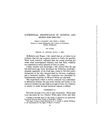 4 citations,
August 2017 in “Cosmetics”
4 citations,
August 2017 in “Cosmetics” The extract reduced sebum production and promoted hair growth.
 2 citations,
January 2012 in “InTech eBooks”
2 citations,
January 2012 in “InTech eBooks” Chemotherapy often causes hair loss, which usually grows back within 3 to 6 months, but there's no effective treatment to prevent it.
 2 citations,
January 1908 in “Journal of the American Medical Association”
2 citations,
January 1908 in “Journal of the American Medical Association” Fear of hair-related issues causes significant mental distress, especially in high-stress women.
 1 citations,
August 2013 in “Springer eBooks”
1 citations,
August 2013 in “Springer eBooks” Birth control pills and anti-androgen medications help manage hair growth, acne, and hair loss in women with PCOS.
 November 2017 in “Elsevier eBooks”
November 2017 in “Elsevier eBooks” PCOS is a genetic disorder affecting women's reproductive health, with treatments focused on symptoms like insulin resistance and fertility.

Dermal stem cells help regenerate hair follicles and heal skin wounds.
 July 2024 in “Experimental Dermatology”
July 2024 in “Experimental Dermatology” AP collagen peptides help hair grow and improve hair health.
October 2023 in “Nutrients” Millet and wheat extracts may improve hair health and promote growth.
 4 citations,
December 2022 in “Advanced science”
4 citations,
December 2022 in “Advanced science” SCD1 is important for hair growth by keeping the connection in skin cells where hair stem cells live stable.
 3 citations,
February 2021 in “Evidence-based Complementary and Alternative Medicine”
3 citations,
February 2021 in “Evidence-based Complementary and Alternative Medicine” The Chinese herbal supplement BeauTop can potentially boost hair growth and thickness by increasing a protein called Vascular Endothelial Growth Factor.
36 citations,
December 2014 in “F1000 prime reports” The document concludes that Hidradenitis suppurativa is often underdiagnosed, lacks definitive treatment, and requires better awareness and management strategies.
 6 citations,
April 2022 in “Journal of diabetes research”
6 citations,
April 2022 in “Journal of diabetes research” Type 2 diabetes slows down skin and hair renewal by blocking important stem cell activation in mice.
 2 citations,
November 2023 in “Bioactive materials”
2 citations,
November 2023 in “Bioactive materials” New method improves copper peptide delivery for hair growth three times better than current options.
 1 citations,
May 2023 in “Frontiers in Pharmacology”
1 citations,
May 2023 in “Frontiers in Pharmacology” Millet seed oil may help hair grow by activating certain cell growth signals.
Editing the FGF5 gene in sheep increases fine wool growth.
 April 2024 in “Skin appendage disorders”
April 2024 in “Skin appendage disorders” Environmental pollutants can damage hair health and cause hair loss.
November 2022 in “Journal of Nanobiotechnology” The developed system could effectively treat hair loss and promote hair growth.
 239 citations,
July 2002 in “Clinical and Experimental Dermatology”
239 citations,
July 2002 in “Clinical and Experimental Dermatology” Low iron and L-lysine levels can cause hair loss in women, and increasing these nutrients can reduce hair shedding.
 91 citations,
April 2017 in “Diabetes & Metabolic Syndrome: Clinical Research and Reviews”
91 citations,
April 2017 in “Diabetes & Metabolic Syndrome: Clinical Research and Reviews” Eating fewer calories, less sugar and refined carbs, and more low-glycemic and omega-3 rich foods can help manage PCOS symptoms.
68 citations,
April 2012 in “Digestive and Liver Disease” Elental is a good long-term treatment for Crohn's disease, similar to 6-mercaptopurine but with fewer side effects.
 50 citations,
November 2010 in “Otolaryngologic Clinics of North America”
50 citations,
November 2010 in “Otolaryngologic Clinics of North America” Recognizing oral symptoms can help diagnose and treat blood and nutritional diseases early.
 38 citations,
January 2015 in “Journal of Cosmetic Dermatology”
38 citations,
January 2015 in “Journal of Cosmetic Dermatology” The nutritional supplement improved hair density and reduced hair loss in women with female pattern hair loss.
 27 citations,
July 1946 in “The journal of nutrition/The Journal of nutrition”
27 citations,
July 1946 in “The journal of nutrition/The Journal of nutrition” Biotin and inositol are crucial for pig health and growth.
 25 citations,
January 2017 in “International Journal of Trichology”
25 citations,
January 2017 in “International Journal of Trichology” Most Indian people with hair loss in the study lacked nutrients, especially iron.
25 citations,
January 1958 in “Elsevier eBooks” 22 citations,
February 2004 in “Journal of pediatric gastroenterology and nutrition” Children with severe ichthyosis and growth failure rarely have nutritional deficiencies or gastrointestinal issues, but may experience chronic dehydration.
 19 citations,
June 2020 in “Animals”
19 citations,
June 2020 in “Animals” Poor maternal nutrition can lead to fewer wool follicles in Chinese Merino sheep.
19 citations,
November 1937 in “Experimental biology and medicine” Nutritional deficiencies in rats cause skin problems that can be treated with the right vitamins.
 18 citations,
January 2004 in “Dermatologic Clinics”
18 citations,
January 2004 in “Dermatologic Clinics” Skin problems in older people can indicate hormonal diseases, nutritional deficiencies, or conditions like diabetes, menopause, and HIV.
 13 citations,
January 2012 in “International Journal of Trichology”
13 citations,
January 2012 in “International Journal of Trichology” Eating too many paradise nuts for cancer prevention caused a woman to lose all her hair due to selenium poisoning.





















